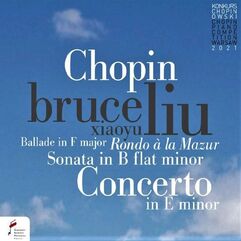 My Recording of the Year could also be described as my Performance of the Year, or even perhaps, in this case, of the decade and beyond. But who am I to judge? And even if my opinion counts, what about all the recordings and performances that I don’t personally experience? Luckily, publications like Gramophone, Fanfare, BBC Music Magazine and various online platforms provide extensive guidance to the numerous recorded performances that become available each year, and their annual awards highlight many rewarding performances. Gramophone’s monthly Editor’s Choice and annual Recordings of the Year awards have led me to many treasured recordings that I might otherwise have missed. For me, last year’s Gramophone Awards included just one recording that struck a special chord – an absolutely stunning (“sensational” was Gramophone’s word; and I couldn’t disagree) Mahler Symphony No. 7 from Kirill Petrenko and the Bayerisches Staatsorchester taking out the Orchestral Recording of the Year. The winners of the choral and instrumental categories are also treasurable, if not quite the knock-out that the Bavarian orchestra delivers. And I do look forward to exploring the same conductor and label’s Bayerische Staatsoper video recording of Korngold’s Die Tote Stadt which won the opera category as well as being voted Record of the Year. Because, although it’s possible to listen to almost all the winners and other nominees with the benefit of a streaming subscription, I don’t have access to the video format in the same way. The preamble to Gramophone’s 2022 Awards issue states that recordings reviewed between June 2021 and May 2022 are eligible for selection, which immediately limits the choice to recordings that Gramophone has reviewed. One might think that any recording considered worth reviewing would surely come their way, but my own personal Record of the Year, along with many others (e.g. those released on the Berlin Philharmonic Orchestra’s own label), was never evaluated by Gramophone’s reviewers. So, why Bruce Xiaoyu Liu’s Deutsche Grammophon recording of selections from his winning 2021 Chopin Competition performances didn’t make the cut, is beyond me. Praised in Gramophone’s December 2021 issue as “ . . . simply one of the most distinguished Chopin recitals of recent years, full of maturity, character and purpose”, along with similar superlatives from a reviewer who also hoped for the release of an album of more of this pianist’s performances from the competition. In February 2022, that recording came, not from DG, but on the Frederick Chopin Institute label. And that is my recording of the year which none other comes within miles of, however special it might be. But it’s an album that seems to have received no awards at all let alone even a review in Gramophone. Everything on both discs is equally breathtaking – an infrequently heard Rondo à la Mazur that becomes a masterpiece in Liu’s hands; an F Major Ballade that combines poetry and drama so intuitively that it’s like hearing it for the first time; an Andante Spianato and Grande Polonaise Brillante that Gramophone’s reviewer declared to be the best he’d ever heard; an A Flat Waltz whose technical demands are mastered so completely that it sparkles and dances as never before – but it’s the magic of Liu’s performance of the E Minor Piano Concerto which is simply jaw-dropping! It’s as if he’s managed to get inside the composer’s inspiration at the very point of its taking flight, and he delivers a performance of such charisma and heart-in-throat dancing, singing, joyful, and instinctive fervour, that a long familiar and oft-heard favourite comes vividly to life in a way that I find difficult to adequately describe. For now it’s the only performance I can listen to, although long-cherished recordings by Ashkenazy, Zimerman, Argerich, Kissin, Perahia, Pires and others, including the previous Chopin Competition winner Seong-Jin Cho, line my record shelves. No doubt there are knowledgeable sages and guardians of various holy grails who will never allow that anything can surpass, say, Zimerman or Pollini or Rubenstein or Lipatti, or any number of others, but for now, for me, Liu reigns supreme. At the 2021 XVIII International Chopin Piano Competition many other fine pianists gave excellent performances of this same concerto, but listening to those or watching them on YouTube, the superior inspirational magic of Bruce Liu’s playing eludes them. His ability to subtly colour or highlight a passing phrase or figuration frequently has me smiling or even laughing out loud at the sheer wonder of it; and it’s all done with such an intuition for light and shade, delicacy and ardour, tonal silver or velvet, and all manner of other intangible contrasts. As I write, the recording is playing again and Liu has just reached his entry in the concerto’s second movement Romance and, although I’ve played the disc so many times already, its heart-felt expressive quality hasn’t diminished in the slightest. Each time I play the recording, now always several self-disciplined weeks apart, I worry that the magic will be lost but, thankfully, there it still is. I first heard and saw Liu’s concerto performance on YouTube after the competition and wondered if it would retain the same mesmerising impact in audio only. I need not have feared; whatever visual wizardry enhanced that first experience remains fully present when just listening. And there too in this live performance is the smiling and idiomatic support from the Warsaw Philharmonic Orchestra and conductor Andrey Boreyko, and the elated shouts of acclaim from the audience even before the orchestra has played its final chords, and then they’re on their feet with a seemingly involuntary need to demonstrate their enraptured appreciation of a performance of a lifetime. As one commenter on the YouTube video observes – “This dude is so good the lady in the wheelchair stands up to applaud”, and so she does, such is the miracle of Bruce Liu’s performance.
0 Comments
|
AuthorTony Ryan has reviewed Christchurch concerts, opera and music theatre productions and many other theatre performances since the mid 1990s. ReviewsTony has presented live and written radio reviews of numerous concerts, opera and other musical events for RNZ Concert for many years. An archive of these reviews can be found at Radio New Zealand - Upbeat
His reviews of opera, music & straight theatre and numerous reviews of buskers and comedy festival performances are available at Theatreview. An archive of Tony’s chamber music reviews is held at Christopher’s Classics He has also reviewed for The Press (Christchurch). Links to Tony's Press reviews are listed below: 2024 Songs for Helen – Music by Chris Adams 2022 A Barber and Bernstein Double Bill – Toi Toi Opera The Strangest of Angels – NZOpera Will King (Baritone) and David Codd (Piano) – Christopher's Classics 2019 Ars Acustica – Free Theatre Truly Madly Baroque – Red Priest The Mousetrap – Lunchbox Theatre Iconoclasts – cLoud Last Night of the Proms – CSO 2018 An Evening with Simon O’Neill NZSO Catch Me If You Can – Blackboard Theatre Brothers in Arms – CSO Fear and Courage – CSO Sin City – CSO Don Giovanni – Narropera at Lansdowne Mad Hatter’s Tea Party – Funatorium Weave – NZTrio Tosca – NZ Opera 2017 Sister Act – Showbiz Broadway to West End – Theatre Royal Chicago – Court Theatre Tchaikovsky Symphony No. 5 – CSO Homage – CSO Last Night of the Proms – CSO SOAR – NZTrio Pianomania – NZSO Rogers & Hammerstein – Showbiz Songs for Nobodies – Ali Harper The Beauty of Baroque – CSO Travels in Italy – NZSO Archives
February 2024
Categories |

 RSS Feed
RSS Feed
